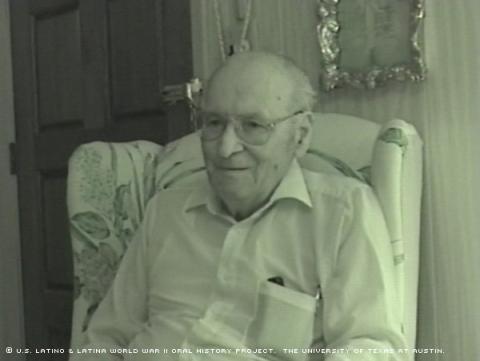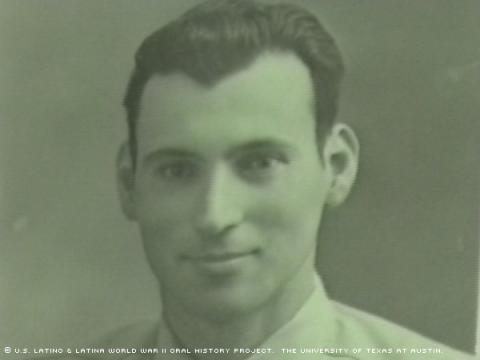

by Minette Hernandez
MCALLEN, Texas -- Ask Heriberto Longoria, Sr. about the license plate on his 1996 Mercury Grand Marquis, and he will proudly tell you the piece of metal, which displays a Purple Heart, cost him only three dollars. To earn those plates, he valiantly fought in World War II, but the scars of war, which tend to toughen a man, have not overcome the 81-year-old veteran.
The youngest of seven children, Longoria was born on November 8, 1918, in Abram, a small Texas community in the Rio Grande Valley. He grew up in nearby Mission, Texas, about 12 miles west of McAllen. Longoria and his family worked on their farm, where they raised cattle and grew vegetables. Although his other siblings completed high school, Longoria dropped out in the 10th grade level to help his family on the farm.
When thinking back to his childhood, hard work is the one thing that stands out in his mind. But, there were some special occasions that broke up the drudgery.
"Every weekend we would go into McAllen," said Longoria, of the "big city" family outings that often included some shopping and a bite to eat at a restaurant.
In 1941 he went to San Antonio to join the Army at age 22 after hearing about the December 7 bombing on Pearl Harbor. The youngest of his family, "Betito," as he was called, would be the only member to embark on a journey that would take him halfway around the world.
Longoria's memories of some events are vague. Others have touched him so deeply that he recalls them as if they occurred yesterday.
One particular memory burns in his mind. Shortly before he was wounded in Italy, a friend from Floresville was killed right in front of him.
"He was in a foxhole and a shell went in there and blew him to pieces," Longoria said.
At the time, he was barely affected by what happened to his friend, he said.
"You think that you are going to die right away because they are shelling. They [Germans] had machine guns on the beach and everything,'' said Longoria, of the moments during and right after his friend got shot.
Longoria's wife, Maria Luisa Longoria, says that memories like these keep her husband up at nights. Although Longoria doesn't dream as often as he used to, memories of the War still plague his sleep. In his dreams, he is usually transported back in time where he is young and fighting again.
"I can see that it [the War] affected his sleeping habits. He wakes up often in the middle of the night. Several weeks ago he went like that,'' says Mrs. Longoria, jerking her arm to demonstrate his restlessness. "We were both asleep. He went like that and he was screaming. I can understand because nobody knows what they went through, just people that were on the front lines."
When Longoria was stationed in Italy, he fought on the front line for two weeks nonstop. Afterward, he and his fellow soldiers got a week of rest. While on their break, he and the other soldiers enjoyed hot meals rather than the cold packaged meals commonly known as C Rations that they ate on the front lines.
They also took showers, which for them meant getting a few splashes of water. Water was scarce and at times they could only fill their helmets with water and sponge off. Weeks would go by without any sort of bath or decent shave.
Similar to the way the weather is calm before a storm hits, the mood was also eerily calm before it was time for the soldiers to return to the front.
"When they would feed us a good meal, we knew we were going to the front lines. They didn't let us know, but we knew,'' Longoria said. "Like at 6 or 7 o'clock we had a good meal and they didn't tell us anything until later on at about 12 o'clock at night. They would say, ' Okay, turn 'em over, we're going to the front.'"
Longoria's most vivid memories however, are those when he was wounded on the beach in Italy in 1944. Longoria was in Italy fighting for a little over a year before Germans shot him. He got hit below the left knee, where a large, deep purple scar is still evident.
Longoria didn't know what had happened until he looked down and saw his blood.
"One of the shells hit me close to where I was and I was thrown way in the back. Then one guy took me to a very big, deep canal and they put some powder on the wound and gave me some pills for the pain. From there they took us about five miles to the back of the front," Longoria said.
The young soldier did not receive aid immediately after getting hit. Longoria recalls being hit at about 5 o' clock in the afternoon and not receiving help till about 6 o' clock the following morning. After a relief team came to get him, he was transported to a tent where they had set up a makeshift hospital. Longoria remained in Naples, Italy, for about two weeks. He was then transferred to North Carolina for four days and then to San Antonio, where he spent a full year recuperating from his wound.
It would be three months before he would be able to get out of bed and attempt to walk. He spent a lot of time roaming around the hospital in a wheelchair, he says.
Although the pain was severe, he remembers receiving penicillin frequently. He also remembers having many friends in the hospital, which made his days go by a little quicker.
Longoria soon found out that he wasn't the only one haunted by war dreams. In the middle of the night, he says other soldiers would wake up screaming and feeling disoriented. Longoria said this was frightening because the soldiers didn't know what they were doing. This condition was commonly known as ''shell shocked."
Longoria would make trips into downtown San Antonio once he was able to walk a little better. In a shaky voice, he described a story about an African American woman who sat next to him on the bus.
"One time I got on the bus and a lady, a colored lady, went in the bus and the driver said to the lady, 'You go to the back, you know where you belong. You belong in the back.' The lady then said,' I have three sons fighting on the front. When they come back, then I'll go back,'" Longoria recalled.
After telling the story, Longoria took a moment to compose himself. Despite the discrimination that was present in the city, Longoria insists that when you are at war, "Government treats everyone the same."
For his bravery, Longoria was awarded several medals, including the Purple Heart, a Bronze Star Medal, the Good Conduct Medal, the American Company Medal, the WWII Victory Medal and the European Champaign Medal. All of these awards and important documents are kept in a safety deposit box at his bank. Rather than being buried with his medals, he will pass them on to his children, he says.
Longoria wanted to remain in the Army, but received a medical discharge in 1946 due to his wound.
He then returned home to Mission, to continue helping with the family farm. One year later, Longoria met Maria Luisa Rincones at a party in McAllen. Three years later, the two were married at Sacred Heart Church in McAllen. They started a family two years later. They raised five children and have six grandchildren, one of whom Longoria is proud to announce is in the U.S. Marines.
Although the War was a difficult part of Longoria's life, he says he would not hesitate to tell his grandson to fight for his country. He will never forget the traveling and the experience he received as a result of his service, he says.
Despite this, Longoria has no romantic notions of combat.
"Nobody should have to fight. War is...they call it hell. War is hell," he says.
Heriberto A. Longoria passed away May 9, 2004

